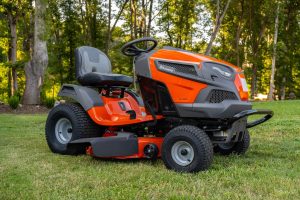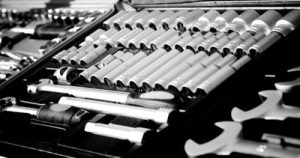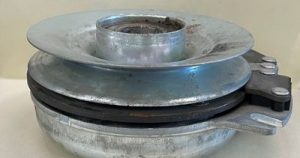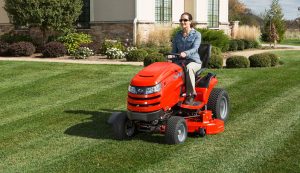Husqvarna vs Ariens Zero-Turn: Which Brand Should You Choose?
There are a gazillion zero-turns in the market to start with, so if deciding which brand will serve you best is the matter, I completely understand.
Chances are you have narrowed your options to the Husqvarna and the Ariens– the most suitable trademarks for your best interest– but which brand manufactures the best zero-turn mower amongst the two?
The Husqvarna and Ariens company are connoisseurs for manufacturing nicely functional zero-turn mowing machines and are well popular for that reason. There are many benefits of choosing a well-known and experienced brand of z-turns; two of those reasons are the ease of access to great service and unmatchable functionality based on the trials and errors the brand has encountered over time. All in all, you can fully trust a boomer brand.
Factually, Husqvarna zero-turn mowers are much more reliable and highly featured compared to the Ariens, and thus are considered the better brand. Although they happen to be more expensive.
In this article, I’ll be comparing the two zero-turn brands to see which company produces the most favorable ZTRs for you based on their strengths and weaknesses. Let’s not spend any more time!
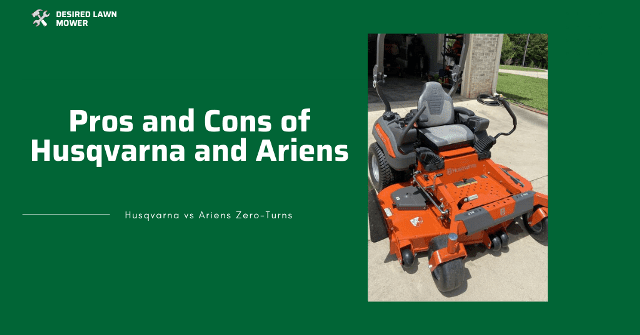
Table of Contents
The Battleground Of Comparisons: Husqvarna Vs Ariens
Considering the machine specs is the best way to identify which zero-turn brand will serve you the better mowing experience, and I’ll be carrying you through the major differences between the two.
Engine and Power Specifics
Most people run to the engine first before checking on other qualities of the zero-turn mower during a purchase, which honestly, isn’t wrong at all. Your zero-turn mower needs to be properly prepared for whatever scenario you throw at it– good, bad, or ugly.
The Husqvarna zero-turn mowers are equipped with either Kawasaki, Kohler, or Briggs and Stratton engines that pump the machines with 23 to 31 horsepower starting from the low-grade residential to the commercial grade models. There’s no doubt how powerful these machines are if you start at 23 hp for a residential. In fact, some zero-turn brands have their commercial-residential models at 23 hp and are quite proud of it.
It’s safe to say your Husqvarna z-turn is appropriately qualified to eat whatever you run across whether you choose a minor or major model. It takes a great weight off of your list of requirements and is the perfect way to start.
For the Ariens zero-turn mowers, the power capacity ranges from 7.5 to 23 horsepower. The difference is alarming! Where 23 hp is paired with an entry-level Husqvarna, you can only find that much power on the Ariens commercial grade.
There are no two ways about this: the Husqvarna is much, much more powerful in comparison to the Ariens, and will tackle tough turfs easier. So if you are one to mow over the most difficult scenarios where the bushes seem to throw fits and fight back when you try to trim, I suggest you go for the Husqvarna ZTR instead.
Cut Quality And Deck Functionality
Personally, cut quality is the most important aspect of a zero-turn mower. I understand the major value of a well-powered engine on a ZTR, but the main purpose of the machines in the first place is to cut nicely, and you’d find out soon which brand cuts better.
The Husqvarna zero-turn mower decks range from 42 to 72 inches, can be welded or fabricated, and can also be 11-gauge or 12-gauge depending on the grade of the model. In terms of cut quality, they cut pretty well– no wonkiness or shakiness that could affect the excellence of the trim.
Husqvarna decks are engineered to build enough airflow that will properly straighten the grass before they meet the blades of the deck. You’ll also find the cutting heights to be from 1 ½ to 4 ½ inches in quarter increments.
Talking about blades, I’ve noticed that although every other build of the machine is superb, the blades get the least attention as they seem to be a little mismatched for the power of the machine. So they would thin out or go blunt much faster than they should. Other than that, the striping and cut quality of this ZTR is satisfying. They’re not the best in the world, but they do a great job.
On the other hand, Ariens deck sizes range from 34 to 60 inches, can be either stamped or fabricated and are all 11-gauge steel decks respectively. In terms of cut quality, the Ariens ZTR cuts superbly. The decks are steady and firm alleviating any chance of stragglers, grass tearing, or uneven cut.
Striping is also quite fun to do with the Ariens, although the quality is only great when you purchase high-grade residential models like the Ikon XD and above. In comparison to the Husqvarna, cutting heights are from 1 to 5 inches in increments of a quarter, so you have extra choices to make depending on your requirements.
In comparison, cut quality is much better with the Ariens ZTRs. This is because the decks are paired with much more durable blades that will slice through the turf in the long run. Although the Husqvarna cuts just as well, grass should be no match for the blades of a deck. Also, you’d have more cutting height options to choose from on the Ariens– it’s a win-win.
Speed And Maneuverability
The best way to enjoy mowing is to get it done in time. No one would like to spend hours upon hours of a good Saturday in the yard seated in a yelling machine.
For the Husqvarna, the speed ranges from 6.5 miles per hour to 13 mph forward speed from the lowest to highest grade models. On the other hand with the Ariens, speed also starts from 6.5 miles and then ends at 8 mph from the lowest to the highest level models.
Evidently, Husqvarna manufactures the fastest ZTR in comparison to the Ariens. It’s safe to say that for every equivalent model of each brand, Husqvarna will run much faster than its competitor.
In terms of maneuverability, I deem it a draw. Both brands are highly sensitive to steering making it easy for you to navigate your ZTR through obstacles like trees and roundabouts. Both the Husqvarna and Ariens are huge promoters of the dual hydrostatic transmission that provides the machine with heightened sensitivity to steering whilst mowing.
The best way to make use of this evaluation is to answer your requirements. The bigger the yard, the more speed you’d require to finish the job faster. Although, keep in mind that cut quality is affected by speed; the faster you whizz by, the more stragglers you leave behind. In some cases, you might not even need all the speed a ZTR is offering.
Comfort And Rideability
If you’re going to be spending quite a chunk out of your pocket to purchase a zero-turn mower, the least you could request is for the machine to not beat you to death.
The Husqvarna has great seats paired with their riding mowers. They are built properly with fair suspension and padding for entry-level models. Although they wouldn’t quite “suspend” you properly from the vibrations of the activity, they are worth the pay. The quality gets much better as you progress through the models; the high-grade and commercial-grade zero-turns come with suspension seats and armrests that will help you with the shockwaves you’d experience in motion.
The Ariens has quite impressive seating; they do a good job of properly padding their seats and adding enough spring suspension for all the models. Their early residential-grade mowers even come with armrests which I found quite interesting because a lot of zero-turn brands would only include those in the residential-commercial and commercial grade models.
Sadly, they do not come with suspension seats as the Husqvarna does, you can only purchase and install them separately. These suspension seats are so important that I have an entire article on the best of their kinds to pair with your z-turn so that you can effectively enjoy your ride especially if you have a tender back.
This evaluation has brought us to a draw; while the Husqvarna ZTR commercial models have suspension seats on them, the Ariens zero-turns are a much better option of comfort for the residential. The most comfortable brand of zero-turns will depend on if you are a residential or commercial landscaper.
Traction And Stability
When you’re at risk of tumbling down a hill or slope the best to look into is the stamina of the zero-turn mower you wish to purchase as that will determine the value of your mowing experience.
The stability of the Husqvarna is impressive; the weight of the machine properly distributed, great traction threaded tires, and wide stance all contribute to the overall balance of the ZTR. If you’re wondering whether or not they perform well on hills and slopes, no need to fuss because that wouldn’t be a problem.
For the Ariens, tackling slopes and hills come a little more difficult to carry out in comparison. This is because Husqvarna zero-turns have wider and beefier tires that provide you with the extra traction required for that kind of job.
Plainly, the Husqvarna ZTRs are a much better and safer match for handling slopes and hills.
The Money’s Worth
The Husqvarna z-turns start cheap but end quite pricey; you start at $4,000 for the entry-level and progress towards $10,000 for the high-end commercial-grade models.
On the other hand, Ariens zero-turns start at $3,500 and go towards $8,000 for the commercial grade. There’s no doubting the difference in pricing between the two brands. The Husqvarna is more expensive in comparison to the Ariens.
Should I Buy The Husqvarna Or The Ariens ZTR?
There are a few ways to answer your question; first, you start with your budget– consider strongly how much you’re willing to let go. If you’re contemplating an entry-level zero-turn, go for the Ariens. They have much better features for that purpose compared to the Husqvarna.
If you’re seeking a high-end residential or a commercial grade ZTR, the Husqvarna is a much tougher and more reliable choice to make as they will cover all problems relating to speed, power, and traction better.
Which Husqvarna Zero-Turn Model Is Best?
I recommend the Husqvarna MZ48 model that features clear-cut 10-gauge steel fabricated 48” deck with a high back seat including armrests. They are equipped with 23-hp Kawasaki engines that give rise to a maximum forward speed of 8.5 mph respectively.
The MZ48 residential-commercial mower is just the right machine for tough turf and difficult challenges you might find whilst mowing. You can even decide to take a side professional hustle on this model– they’d fare just fine. You’ll find them to be around $5,000 to $6,000 depending on your dealer.
Unless you’d rather go fully commercial-grade, then I recommend the models above the MZ48. They’re all commercial-level going upward.
Which Ariens Zero-Turn Model Is Best?
The Ariens Apex 48” deck model is just the best ZTR for doing most of the job whilst keeping it simple. They entail a fully fabricated commercial-grade 10-gauge steel deck with exclusively padded comfy seats that come with armrests. Similar to the Husqvarna, the Ariens Apex is equipped with a 23-horsepower Kawasaki engine for the long run.
You can easily merge residential and professional mowing as you desire with this model as they’re up to the task. I recommend this z-turn mower because of its ability to offer residents commercial benefits. They come at the price of around $6,000 also depending on your dealer.
A Wrap-Up
From a general perspective, the Husqvarna offers better features as compared to the Ariens, but the only determiner of that fact is you, the user. So I suggest you go through your requirements to see how each brand answers your needs. You can easily match your bumpy, hilly, or aesthetically pleasing lawn to the correct brand for you. Good luck!
